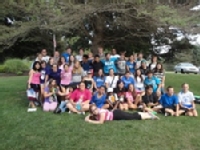New collaborative program ‘sparks’ a flame in area children

On a recent summer Friday morning, a large recreation room at The University of Scranton's Retreat Center at Chapman Lake was abuzz. A large group of young people, ranging in age from 12 to 20, was playing a spirited game of musical chairs. As the sun winked on the waters outside, the players vied for the dwindling seats. It could be a scene from a summer camp anywhere in the country, but this one was different. The game was one of the concluding activities of a new joint University of Scranton/Scranton Prep community outreach program called SPARK. The players so boisterously interacting were 10 University students, 10 Scranton Prep students and about 30 at-risk teens and pre-teens from the greater Scranton community.
The SPARK program is the brainchild of Patricia Vaccaro, the University's director of community outreach, and a former University student volunteer, Danny Marx ’09. As an undergraduate, Marx donated much time to University service projects and he and Vaccaro had long sought a way to work together again. A collaboration seemed almost inevitable when Marx landed a job teaching math at Prep. Both Prep and the University are Jesuit institutions, which means they share a dedication to Ignatian spirituality and ideals such as Cura Personalis, which is an approach to service that uses individualized attention to the needs of the other; distinct respect for his or her particular circumstances and concerns; and an appropriate appreciation for his or her gifts and insights. SPARK was created as a way for the schools' students to put this uniquely Jesuit ideal into action.
SPARK focused on at-risk youth between the ages of 12 and 16. Vaccaro said nonprofit community partners like Friends of the Poor and United Neighborhood Centers identified this age group as most in need of a program, since these children are “too old for day camp and too young to be employed,” she said.
The program was built to foster teamwork and self-esteem through educational and outdoor activities. Each day of the weeklong program featured a theme, such as effective communication, identifying and being a good role model and making good choices. University and Prep students designed fun but thoughtful games and activities to deliver the positive messages.
“We played Simon Says as a way to illustrate who kids should follow and who they should not,” said Jackie Bailey, Scott Township, who will be a senior at Prep this fall. “I didn't know what to expect when the week began, but the minute I met the kids, all my worries were gone. They were engaged and interested every single day from the beginning.”
Ryan Robeson, Scranton, who will enter his senior year at the University this fall, led activities like a “rap battle,” meant to get the participants to think about who they are and what talents they possess. The children also took part in “Skittle riddles,” an activity that demonstrated that outward appearances does not always indicated what's inside. Robeson and Bailey also described a bean-bag toss that required the participant to move further away from the target with each successful toss. “That was meant to show how sometimes things become more difficult and how to keep trying when that happens,” Robeson said.
Perhaps the most memorable activity of the week was taking the children white-water rafting. “We had a girl who was absolutely terrified of the water,” Bailey said. “Both Ryan and I stayed with her and talked to her and by the end she was swimming!” Bailey said it was a lesson in teamwork for all three of them.
On that recent Friday morning, after the music stopped and the last chair was removed, the children sat cross-legged on the floor and reflected on what they learned that week.
“A spark is the start of something,” one child said. Prompted to build on this idea, others added their spark would start “new friendships,” “self-confidence,” “team work” and “generosity.” Some of the children saw a similarity between the Olympic torch and the “spark” they kindled during their week in the program. “Like the torch, we have to keep passing this on,” said one child. Others added, “We can keep passing the torch by trying new things, caring for others and being an ‘upstander,’ not a bystander.” Another child summed it up most succinctly, “We were all alone at first,” she said. “Now we have a pile of friends.”